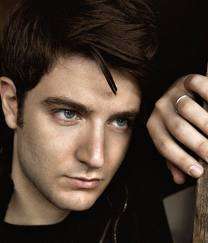|
Back
The Painter and the Poet New York
Caspary Auditorium, Rockefeller University
11/28/2012 -
Sergei Rachmaninov: Prelude in C-sharp minor Op. 3, No. 2 – Vocalise Op. 34, No. 1 (arr. Alessio Bax) – Prelude in G-flat major Op. 23, No. 10 – Hopak (from Mussorgsky's Sorochinsty Fair) – Prelude in G major Op. 32, No. 5 – Prelude in G minor, Op. 23, No. 5 – Liebesleid & Liebesfreud (from Kreisler)
Modest Petrovich Mussorgsky: Pictures at an Exhibition
Alessio Bax (Pianist) 
A. Bax (© Lisa Marie Mazzucco)
”Dear Mr. Rockefeller: May I humbly request that you sell a case of your Château Lafite Rothschild 1982, and purchase a new air-conditioner for the otherwise charming Caspary Auditorium? During the hushed sections of Alessio Bax’s recital last night, your machine snorted and grunted like one of your great-granddaddy’s oil pumps. Sincerely, etc etc.”
I had vowed not to mention the machinery in this review, but during the “Cum mortuis in lingua mortua” section of Mussorgsky’s Pictures at an Exhibition, Mr. Bax’s pianissimo was so quiet, mournful, songful and above all constant (almost impossible for most pianists), that I imagined the composer himself, inebriated but brilliant at the piano, screaming and stamping out.
Mr. Bax would not do that, because, from his playing of the Mussorgsky, he was so involved, his poetry so inward, his imagery so conspicuous (the wagon wheels on “Bydlo” went deep into the mud, the “poor Jew” was literally whining) that he probably would not have noticed it.
Still, the pianist did deserve better from that machinery. The Italian-American pianist, first prize winner of the Leeds, and the Avery Fisher Center Grant, is simply one of the most vivid pianists around. Mr. Bax’s velvet-and-steel digits were translated to stunning optic nerves. The Mussorgsky needed no gallery for the pictures. They were not so much framed portraits as frescoes, sculptures which one could almost touch. And if some sections were played at a too-fast pace, that was allowed too. The composer didn’t write music for a salon, he wrote with the same passion that he wrote Boris, and Mr. Bax obviously knew it.
The first half, all Rachmaninov, with a few transcriptions, was a different story. Certainly not inferior technically, since Mr. Bax can whizz around the piano with the greatest of ease. He may have taken technical liberties at times, but it was all in the spirit of the recital. And after all, these were eight single short pieces, so neither he nor we needed to sink into an eternity of Mahler/Bruckner emotional depths.
Thus, his own transcription of the famous Vocalise may well have thickened up the harmonies, led us into a forest of tones. Thus, he may have varied the composer’s own transcription of two works of Fritz Kreisler, taking us out of Old Vienna, past a Horowitz eccentricity into something mucilaginous, a sort of Liberachmaninov.
But oh, when Mr. Bax played with sensitivity in the Preludes, it was difficult to see how they could be improved. This was romance with only a scintilla of Slavic edge. He even had the audacity to start with the most popular music since Beethoven’s Fifth, the C Sharp Minor Prelude and give it a grandeur which transcended mere popularity.
Was there too much poetry, not enough bite? Perhaps this was the way he saw it. When Mr. Bax played the famous “Alla marcia” Opus 23, Number 5, one remembered the so limpid 16th notes of the middle section more than the march. The G Minor Prelude could have been Chopin, a century before.
In a way, it was a relief to hear Mussorgsky’s bite in the Rachmaninov Hopak transcription. Even the most verdant water colors need a few demonic gnomes to make the garden shine.
In all, though, this was a concert which Mr. Bax evidently enjoyed as much as the audience. His first encore the Scriabin “left-hand” prelude, was lovely by itself, But when he played a Brahms Hungarian Dance, he let himself go a bit wild, he enjoyed taking mini-kitschy but always gorgeous liberties.
Mr. Bax has the fingers, the mind and the audacity to carry it off, not only with brilliance, but with well-deserved delight
Harry Rolnick
|